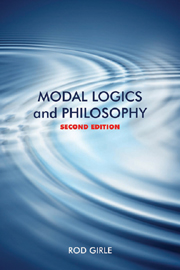1 - Argument and modality
Summary
Introduction
One of the main tasks of logic is to give an analysis of argumentation. Traditionally this analysis is of premise-conclusion argumentation. If formal methods are used, one begins with propositional logic.
The most common form of propositional logic is truth-table logic. Truthtable logic extends very easily into truth-tree logic. We assume that the reader is familiar with propositional logic in both truth-table and truth-tree forms. From this point we shall use the term propositional logic to refer to truthtable and truth-tree propositional logic unless we make it clear otherwise. Most of this text can be read with a knowledge of propositional logic only.
Propositional logic is usually extended to predicate or first-order logic. To read the whole of this volume the reader should be familiar with predicate logic and the system of truth-trees for predicate logic. Several texts introduce the reader to propositional and predicate logic and the truth-tree system. They are listed in the further reading at the end of the chapter.
Argument analysis
There are arguments that are clearly valid, but that cannot be shown to be so by propositional logic. Arguments such as:
“All Athenians are Greeks.
Socrates is Athenian.
So Socrates is Greek.”
require a more detailed analysis of their logical form than can be given by propositional logic. We need a logic that can deal not only with the negation, disjunction and conjunction of propositions, but also with quantifiers (all, some), predicates (is Φ) and relations (loves). The result is predicate logic.
- Type
- Chapter
- Information
- Modal Logics and Philosophy , pp. 1 - 10Publisher: Acumen PublishingPrint publication year: 2009



